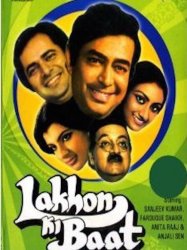Manas Mukherjee est un Son

Manas Mukherjee (also known as Manas Mukharji) was a renowned Bengali music director, who composed several albums in Hindi. Mukherjee was also the parent of two well known Indian singers, Shaan and Sagarika. He died in 1986.
Source : Wikidata
Manas Mukherjee

Mort 1986
Le plus souvent avec
Filmographie de Manas Mukherjee (3 films)
Son

Lakhon Ki Baat (1984)
Réalisé par Basu Chatterjee
Genres Comédie
Acteurs Sanjeev Kumar, Farooq Sheikh, Anita Raj, Utpal Dutt, Dinesh Hingoo, Javed Khan Amrohi
Note64%





Sports photographer Alok Prakash (Farooq Shaikh) is shooting a female hockey game when he's hit with a stray puck. Prakash is hospitalized but only suffers from minor injuries, though his enterprising brother-in-law, Prem Sagar (Sanjeev Kumar), sees an opportunity to make some easy money. Sagar, a lawyer, asks Prakash to exaggerate his injury so he can file a lawsuit and they can live off the settlement. Soon, the whole family is involved, and Prakash and Sagar find the ruse hard to keep up.
 , 1h50
, 1h50Réalisé par Saeed Akhtar Mirza
Genres Drame, Comédie, Romance
Acteurs Naseeruddin Shah, Shabana Azmi, Smita Patil, Om Puri, Sulabha Deshpande, Arvind Deshpande
Note70%





The film captures the angst of a worker, in Mumbai exemplified by a young Christian car mechanic, Albert Pinto (Naseeruddin Shah) who is under the illusion that if he works hard and emulates the rich, one day he can also be successful. He makes friendly relations with his customers, who are usually the rich of the city and who keep telling him that good workers do not go on strike. Strikes are the handiwork of lumpen elements. Pinto gets angry with the supposedly wrong attitudes of the workers who he assumes go on strike under any pretext. However, when Pinto's father, who is a mill worker is abused by the lumpen elements hired by the mill owners, he realizes that it is not the workers but the capitalists who should be blamed for the plight of the workers. He also realizes the legitimacy of strikes. Towards the end of the movie, Pinto still remains an angry man; but now his anger is directed against the capitalists, not the striking workers.
 Connexion
Connexion




